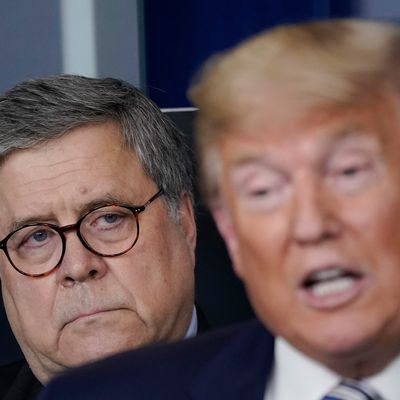
The prospect of a Joe Biden administration has historians, constitutional-law scholars, and pundits debating how the new president might go about restoring the norms of governance damaged by the Trump administration over the past four years. Bob Bauer and Jack Goldsmith, former White House counsels under Barack Obama and George W. Bush, respectively, recently published the book After Trump: Reconstructing the Presidency, which offers 50 proposals to reconstruct the laws and norms of the highest office. MSNBC’s Chris Hayes and historian David Perry have called for some kind of truth-and-reconciliation commission, an idea that Jill Lepore argued against in the Washington Post. Lepore instead wants journalists and historians to have the final say. “Stopping the destruction of records is where the real fight lies,” she wrote. “The rest is noise.”
Back in June, Mark Tushnet, an expert in constitutional law and a professor emeritus at Harvard Law School, proposed something more specific: a commission of inquiry to investigate the Department of Justice under Trump. Attorney General William Barr’s DOJ has provided no shortage of irregular behavior, from Barr’s distortion of special counsel Robert Mueller’s findings, to the department’s efforts to turn up evidence of voter fraud, to reports that Barr has rushed investigations to score points for Trump before Election Day. Tushnet believes there is some agreement on both sides of the aisle that something went wrong during the Trump administration. “When there is such a sense, it might be worth having a system that would let us find out what happened without deploying the big guns of criminal law,” he says. Intelligencer spoke to Tushnet about what his proposed inquiry would look like, what its aim would be, and whether it would even be feasible in such a divided country.
Trump is popular among Republicans everywhere. So how would a commission like this be possible in a bipartisan way?
It shouldn’t be presented or understood as a partisan exercise aiming at stigmatizing the Department of Justice under Trump. The idea would be to examine the behavior of the Department of Justice in light of what had been widely accepted norms about the department’s performance and see whether or where departures from those norms had actually occurred. My own sense is that such an inquiry would lead to a complicated outcome. Some things that people have described as norm violations probably weren’t; other things probably were. I don’t know how things would get sorted out, but I think the exercise would be useful.
This would be a more focused, incident-based inquiry, rather than a general inquiry into Trump’s DOJ, right?
Think of it as an accounting of things on the asset side and things on the liability side. We wouldn’t come to a conclusion about whether the liabilities exceeded the assets. You put it out there and let people judge what had happened for themselves and let the political system decide whether something needed to be done.
What do you see as the most important incidents or events this commission should investigate?
There have been so many episodes that it’s hard to keep them in mind or to know which one will be more important than others. The first thing the commission would have to do is identify the things that it concludes would be worth looking into more closely, and I have no presuppositions about what that would be.
You say this commission should not conclude by recommending any prosecutions. Why?
First of all, the federal criminal code is so expansive that a determined prosecutor can probably find some criminal statute under which some, maybe many, actions taken in the Department of Justice would fall. Some kind of corruption, some kind of obstruction of justice, violations of prosecutorial discretion. But many — maybe nearly all of them — would be triggered by facts whose significance would be politically contestable. I don’t particularly like the phrase, but these prosecutions would be construed as the criminalization of policy differences. That shouldn’t happen. Policy differences shouldn’t be criminalized. But it would be very hard to avoid the appearance, to some people, that that was what was going on. That should be avoided from the outset by saying we’re not interested in coming up with potential criminal violations; our job is just to find out what happened and let other people decide what to do about it.
I should note that I do have an exception. If the investigation or inquiry turned up straightforward, classical bribery — say, some deputy assistant attorney general accepted money in exchange for dropping an investigation or ordering people to drop an investigation — that should be prosecuted. But that’s not the criminalization of a policy disagreement; that’s just ordinary bribery.
When they think of a commission not recommending prosecution, a lot of people will say, “Why should the fact that they did these things for political purposes preclude them from criminal or even civil prosecution if the policies led to deaths or to parents being separated from their children?” Why shouldn’t they suffer consequences?
Because I would distinguish between doing things for political reasons and doing them with criminal intent. If it were the case that there was a list of 500 parents and somebody said, “I’m going to destroy this list because I don’t want those kids to be reunited with their parents,” that would be one thing. But if, as is much more likely, it turns out that the names were lost because of a bureaucratic fog, nobody followed up on papers that they should have followed up because a lot was going on, I think it’s worth pointing that out and saying the policy was bad because it couldn’t have been implemented in a humane way, but it would be a criminalization of a policy disagreement to say this was so bad that we’re going to treat it as a violation of a federal criminal statute.
So what safeguards would there be against recidivism of the people who have made inhumane policy decisions? Is it up to journalists and historians? What other enforcement is available to the public?
There are immediate social sanctions available. I’m retired, but I was in a law school and one thing that would happen is that people who had served in positions that would ordinarily get them invitations to speak at law schools wouldn’t be invited to speak because they had behaved so badly. So there are things that can be done. Law schools can’t completely control who gets invited by student groups, but you could have protests when these people do appear and that’s fine.
Who would sit on this commission?
I’ve suggested that it would have a bipartisan leadership. In other countries, retired judges typically head these kinds of inquiries. I don’t think we have in this country judges who could do that because of the politicization of the courts, but maybe you could find two retired judges, one Democrat and one Republican.
My suggestion was actually quite specific. There are two former solicitors general — Don Verrelli and Paul Clement, one Democrat and the other Republican — both of whom have extremely high reputations in the Washington legal community, and both are former insiders to the Justice Department so they know what the norms were. They’d have to staff it up, and that might be tricky, they’d have to hire an executive director. My former colleague Jack Goldsmith might be an appropriate person to do that; he’s an anti-Trump Republican who is not a prominent “Never Trumper.” Then there’d have to be staffing. They’d have to be careful about who they’d hire, because we know what can be made of the political affiliations of the staff. But those are things that sensible managers would always do, and I’m sure Verrelli and Clement would be quite sensible about this sort of thing.
Obviously, it will be seen as political from the start. Is there anyone in the Republican leadership who you think might actually be willing to do this?
At the moment, probably not. A lot might depend on, to put it bluntly, how severe a spanking the Republicans get in the election, if they do get one. If they get a really serious spanking, you might find some willing to grudgingly go along. Nobody is going to be wildly enthusiastic about this, but I suppose you might imagine Senator [Ben] Sasse, given what he’s said over the last couple of weeks, would be willing to say this seems like an okay thing to do.
Would the investigators have the same powers as criminal investigators? Would they have subpoena power?
My inclination would be that they should have subpoena power but should exercise it sparingly. Almost everything that would be of interest would exist in recorded form inside the Justice Department, whether by memos or emails, and that would be accessible in the ordinary course of things. They would have the power to invite people to testify. I’d be skeptical about this proposition, but it might turn out that there are a handful of people whose in-person testimony would be really essential to understanding some really important event and so they should probably have the power to subpoena that person if they aren’t willing to testify voluntarily. But I don’t think it would be appropriate to see FBI agents deployed around the country with tons of subpoenas to get people to show up.
You mention the 1968 Kerner Commission as a point of comparison. Would this be modeled on that?
That’s a little tricky because the charge for the Kerner Commission combined an incident-specific focus — it was charged with finding out what happened in the urban disorders of 1968, so it was a factual inquiry — but it was also charged with making recommendations at the broad policy level. My own view is that what we will need is a much more factually focused inquiry, not a wide-ranging “Here’s what the policies of the Justice Department should be going forward.” I think we need to know what happened. If things went wrong, as they did in some instances, we need to know exactly what went wrong so that people can decide what to do about it.
A common sentiment is that the Trump administration has broken so many norms that will never be the same again — the infamous meeting between Bill Clinton and Loretta Lynch on the tarmac seems quaint now. As a skeptic, I think it’s hard to imagine a commission like this reclaiming those norms.
I don’t want to commit to conclusions that I would draw at the end, but it would not be out of the question that the commission would end up saying that some of Attorney General Barr’s comments about pending but not fully disclosed investigations were inappropriate and should not be repeated. That would have some effect for some number of years. The world changes, and norms change — so you can’t guarantee anything — but I don’t think that generalized skepticism about accomplishing anything by pointing out that this behavior occurred is warranted. Trump and Barr would say it’s a witch hunt. But if properly structured, and if the Republicans take a spanking, such claims would be discounted.
Since you committed this idea to paper last June, has anything happened to make you rethink it?
The only comment in this area that is of concern is the language of truth-and-reconciliation commissions, which I think is inappropriate. That’s not what we need to look for. But it is encouraging that people are at least talking about truth-and-reconciliation ideas and my colleague Jill Lepore’s piece about leaving it to historians and journalists. Of course, I think my idea is better than the others, but as far as I’m concerned, getting the system to set something up would be a good idea.
This interview has been edited and condensed for clarity.






























